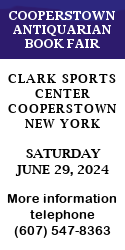Catching Up With the News
For some reason newspapers seem to pile up effortlessly around here. We get a Syracuse paper on weekends, the local weekly, and the Financial Times (the pink one, based in the UK). The FT gets most of my attention because of its solid coverage of world news and columns that include book reviews, the arts, finance, and opinion. The columnists I read most include Robin Lane Fox (recently retired Oxford classicist and gardening expert), David Tang (Agony Uncle), Gillian Tett, Harry Eyres, Lucy Kellaway, John Authers, and so on. A lot to get through.
Mixed up near the bottom of my reading pile are a few overlooked papers still waiting to be read. Hang on, here's one ...a Cincinnati daily with some interesting items. In the May 31st issue a correspondent from St. Louis writes:
“A very important element in both the prosperity of the city and in the strength of the Republican party is the very large proportion of Germans... they build the houses, grade the streets, and are the common hands in all our workshops and factories. Prudent and frugal, as well as industrious, they soon become property holders, and identify with the places of their adoption. They are also free labor men, and they do not hesitate to proclaim their dislike to (sic) the system of slave labor... They are, therefore, by nature Republicans (and) range themselves under the Republican banner. They constitute the backbone of this party in St. Louis, and they will in all the Free States, when they come to understand where the Democratic party has drifted.”
And on page 3 a short dispatch from Boston informs readers the “...New England Anti-Slavery Convention assembled in the city today (and)... Mr. Garrison presented a series of resolutions, varying little in tone and character from those presented at previous Conventions. Among the speakers were Messrs. Wendell Phillips, Fred Douglas (colored) of Rochester, R. Garrison, and others...”
Joke's over. Even though I really don't read that slowly, printed matter does tend to accumulate. And as interesting and ephemeral as early pamphlets can be, many of the important ones, such as those by Thomas Paine, William Cobbett (Peter Porcupine) and others are well known, well preserved, and readily available for use by historians or curious readers. Nearly all important research libraries either own or have access to them.
Old newspapers are another matter. History is constantly being revised—potted histories or biographies that appear within weeks of a momentous event are almost by definition less reliable than those written after enough time has passed so that new sources of information can be found and tapped. In other words, revisionist history is not always a term of reproach—unless, of course, personal bias gets in the way of accuracy.
In any case, in the interest of full disclosure, the quotations are from the May 31, 1860 edition of the Cincinnati Gazette and a presidential election is coming up in the fall. The political conventions at that time were held earlier than they are now—nowadays they mostly serve as a rubber stamp. At any rate, the Democrats who began their convention in Charleston, adjourned to Baltimore after the atmosphere in Charleston became politically overheated. A correspondent from Louisiana reports:
“The Ouachita Register, the chief Democratic paper of Northern Louisiana, thus speaks of the Baltimore Convention... ‘Mistaken men are calling for delegates to be sent to Baltimore. Let them call and rant on. We warn all men of this bastard at Baltimore. Touch it not: there is death in the pot. It will prove a Pandora's box, full of all evils, dire and dreadful. Let the South and her friends take warning’.”
Also, we shouldn't forget that slavery was not the only issue important to voters at the time. When Lincoln campaigned in Pennsylvania he spoke about tariff policy as much as anything, as another report in the same paper reminds us:
“There is much pleasure expressed , in some of the Abolition-Republican papers, at the prospect of having ‘an old high-protective tariff... Whig’ for President... There is a good deal of anxiety on the part of the Democracy to have their partisans in the United States Senate vote for the protective tariff in order to satisfy Pennsylvania...”
This only reinforces what several historians have said—that if Lincoln hadn't stressed the importance of strong tariff protection while stumping in Pennsylvania, an important swing state then and now, there's some doubt as to whether he would have been elected. And, of course, it should be understood that the South was very much in favor of low tariffs, which meant access to cheaper manufactured goods from England—a lot of it passing through Charleston. (Nowadays, the electorate is divided over the question of cheaper manufactured goods from China).
As the spring progresses, the Gazette reports on the growing support for Lincoln's candidacy, and an older man with ties to the founding fathers endorses him as follows:
“Edward Coles of Philadelphia, a man of advanced years, who was Private Secretary to Jefferson and Madison, sent word to the Republican Ratification meeting that he should support Abraham Lincoln. He said he imbibed his democracy directly from Jefferson, and should be true to its principles by supporting the Chicago nomination.”
And finally, a brief excerpt from a Washington correspondent's lengthy impression:
“As I have said before, I 'cotton' to Mr. Lincoln, and this is saying a good deal for a man who, being an old resolute fossil Whig, intended to vote the Bell ticket... I spent an agreeable day with Mr. Lincoln just after the senatorial race in Illinois. He lives in a plain, modest frame house in Springfield. He answered my summons in his shirt sleves (sic), tolled me off to his office, he on a walk, I on a trot—if he runs as he walks, who shall keep up with him (?) ... and a merrier chat of humor, contemporaneous history, anecdotes... I never held or expect to hold. His remarks on Mr. Douglas were magnanimous to the last degree... His stump efforts are always elevated, however, any one of them would do in any deliberate body... He is no trickster in speech, no demagogue in appeal, but a clear and distinct reasoner... His kindness of heart... have kept him from being a rich man, (although) ... his proximity to those lobbies wherein the fate of the Great Western Central Railroad has been often suspended, would have made a less scrupulous man a nabob...”
The fascinating thing about digging through old newspapers is the chance to discover some forgotten bits of reporting that may have escaped the notice of historians. There's still a small pile to get through—wonder what will turn up next?
A Postscript:
Most people get the news differently these days, more of it electronically—yet even television news has changed a lot. Compare the gravitas of the Ted Koppel & Peter Jennings era with ABC's new Ron Burgandy anchorman approach. To compete with PBS, overseas television news (especially Deutsche Welle) and the Internet, American television news programming has tended to go the entertainment route—which it does very well indeed. A television news crew with all its attending paraphernalia can have the effect of a flash mob—people will often gather just to see what the excitement's all about. And television news as entertainment can and sometimes does help to create even more news.
Consider the late violence in Ferguson, Missouri. For days preceding a grand jury's conclusion that there were not enough grounds to indict a police officer for shooting and killing a young man who shortly before had been involved in the petty robbery of a convenience store, the television news people were constantly drumming up interest in the story. Nearly everyone would agree that police violence is a very serious matter that should be widely reported and investigated. For whatever reason that doesn't always happen.
In the case of a more clear-cut and highly documented example of police brutality, the police in Fullerton, California slowly and savagely beat to death a young street person suspected to be high on drugs—never coming out of a coma, it took Kelly Thomas about two days to die. In spite of the evidence and more than a half hour of video surveillance tape, in which Thomas can be heard saying "I can't breathe" and "help me dad, help me dad...", two of the policemen were tried and acquitted earlier this year. The event was well covered by the media in and around Fullerton, but I don't recall national network television news ever giving the story any serious notice. The question that begs to be asked, of course, is what is there about the Kelly Thomas story that makes it so unnewsworthy?

























